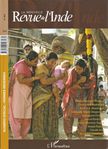 I returned at 4pm. The man at the window looked surprised to see me. “Room 105!” he barked. In room 105, another man I had dealt with also seemed surprised to see me. He looked at the
clock, which said 4:05pm. Then he looked at me. “Receipt?” he asked. Unfortunately, I had not kept the receipt for the Dh30. This was apparently A Problem. “No receipt? No receipt?!?” He
gestured for me to wait, then left the room for 5 minutes.
I returned at 4pm. The man at the window looked surprised to see me. “Room 105!” he barked. In room 105, another man I had dealt with also seemed surprised to see me. He looked at the
clock, which said 4:05pm. Then he looked at me. “Receipt?” he asked. Unfortunately, I had not kept the receipt for the Dh30. This was apparently A Problem. “No receipt? No receipt?!?” He
gestured for me to wait, then left the room for 5 minutes.
When he came back he explained that I would have to write a letter stating that I did not have the receipt, stating the receipt number and my passport number, sign and date it, and
give it to him. “Sir, I do not have either my receipt number, since I lost it, or my passport number, since you have it.” He looked as though he had never experienced a bigger pain in the ass
than I, and quickly wrote down both the receipt number and my passport number on a piece of paper.
I went out into the hall and wrote the letter, but the official refused to take it. He told me to sit and wait for another official who was not at his desk. I sat and waited. It was
4:20pm. The office closed at 4:30.
The Missing Official appeared at 4:28 and seemed surprised to see me waiting for him. I told him that the Other Official had told me to wait for him. They yelled over the partition
at one another for a while in Hindi. I heard the ‘receipt’ several times. Then the Missing Official (now present) stood up, looked at the Other Official, gestured towards me, and said in English
“Give it to him.”
I was given my passport, which now had a new full-paged stamp that read:
“No Objection granted to return to
India before 11-Mar-2011 . Registration
required with FRRO within 14 days of arrival.”
N.K. SINHA
Vice Consule
Consulate General of India
Dubai (U.A.E.)
He explained to me that I would need to register with the Foreign Regional Registration Office when I got to India. “Even if I’ll only be there for one day?” I asked. “Yes, you will
need to register.”
I flew to India on the 6:30am flight on 13 January, and
found my way to the guesthouse that Dan was using1. Dan was off interviewing potential hires at the Indraprastha Institute of Information Technology (IIIT), so I decided to get the
‘foreign registration’ thing out of the way.
I tried to anticipate what the registration office would ask for, and used the guest house computer to print out my British Air departure itinerary, and also had them make several
copies of my passport. They also warned me that I may need to pay ‘baksheesh’ (a bribe) to get my registration. I said that I didn’t think that was a good idea, and they seemed moved (but
saddened) by my idealism. They called me a car, and I was off to the FRRO office, which thankfully was only about 5km away. As we drove off, one of the staff ran alongside the car, leaning into
my open window, telling me “I have a friend who is a guard. I will meet with him tonight and plead on your behalf!”
The FRRO office was a confusing mass of people. Outside the building were rows of chairs containing resigned-looking people who sat waiting, though it wasn’t clear why. Since nothing
seemed to be happening outside, I went into the building and made my way to a large hall with even more chairs and more resigned, waiting people. This hall also had 10 windows. Each staffed
window had a mass of people pressed up against it, all vying for the clerk’s attention.
Thankfully there was a reception desk, and I queued up to speak with the man there. While I waited, people kept wedging themselves in front of me. I would tap them on the shoulder
and give them a meaningful look, and they would acquiesce and line up behind me.
The man said that to register I would have to provide a ‘C Form’ from the hotel, fill out two different forms, make 2 copies of one of the forms, and provide four passport photos.
Since I didn’t have any of that, it was back to my waiting driver and back to the hotel, where I assembled the necessary paperwork. I already had a packet of extra passport photos2.
Then back to the F.R.R.O. Unfortunately, the reception desk wasn’t staffed. As I looked around, I noticed that though the room was full of people, none of the desks or windows were
staffed. I turned towards a large and helpful-looking person.
“Namaste. Do you know where everyone is?”
“Dude, they’re all at lunch. They’ll be back in about ten minutes. Hang loose.”
The large and helpful-looking person spoke like a valley boy, and in fact it turns out that he was an Afghani from Sacramento. And how was he finding India? “First time, man, and
I’ll probably never be back. Too much hassle, but the weed is good. But seriously, dude, you need to come to Kabul, that place rocks. The Taliban don’t really bother Americans much, and the party
scene is extreme.”
After about ten minutes the staff reappeared as predicted, seeming to materialize at their desks with stamps in hand. I was sitting on the receptionist’s desk to ensure my position
as first in line. (Despite this, people leaned across the desk in front of me trying to get the receptionists attention. A tap on the shoulder and a reproachful look sent them to the back of the
line.)
The receptionist looked at my papers, handed me extra copies that weren’t required, stapled the remaining papers together, told me to add passport photos here, here, here, and here,
and then handed the stack back to me. “Window 5″ he said, dismissing me.
I went to Window 5, which amazingly was the only window without a mass of people pressing to be served. There a weary-looking middle-aged woman looked over my paperwork. Alternating
between making notes on my forms and typing things into her computer, she spent the next ten minutes working on my submission. There was much rubber-stamping. Eventually she handed it back to me
and gestured across the room. There sat another desk with a sign saying “Inbound”.
I queued up for the desk. There were several people ahead of me, but people still tried to push their way directly to the front of the line. Each time I tapped them firmly on the
shoulder, and gestured with my thumb to the back of the line. Each time they looked surprised to find that there was already a line at the desk, and joined the queue. It’s like what I’ve learned
of driving in Delhi… “The only thing that matters is what is ahead of you. What is to the sides or to the back does not matter.” If you manage to make it to the desk, then what is behind or to
your side doesn’t exist.
When I got to the front of the line ten minutes later, the woman took my papers. She stamped them a few more times, put the majority of the papers onto a large pile on her desk, and
then handed me one sheet. “You must give this to immigration when you leave India” she said.
When I got back to our guest house, they were astounded that I had been registered in only one day. I was repeatedly asked by the staff how much baksheesh I had paid. When I told
them ‘none’, they looked even more astounded.
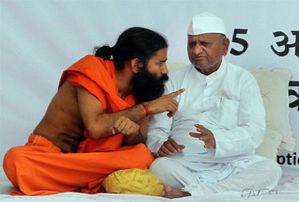 Le feuilleton de la Lokpal Bill continue mais cette
fois-ci avec un acteur supplémentaire; en effet le célèbre gourou Baba Ramdev s’est joint au mouvement et va entamer une grève de la faim.
Le feuilleton de la Lokpal Bill continue mais cette
fois-ci avec un acteur supplémentaire; en effet le célèbre gourou Baba Ramdev s’est joint au mouvement et va entamer une grève de la faim.
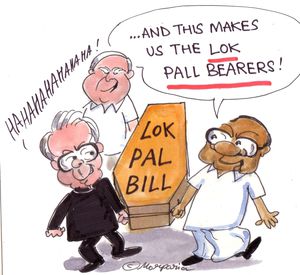




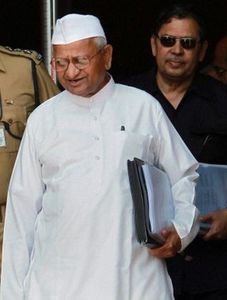 Nous avons déjà abordé le sujet de la Lokpal Bill, cette fameuse loi
devant instituer une Commission spécialisée ayant des pouvoirs d'investigation les plus parges contre les fonctionnaires ou politiciens soupçonnés ou impliqués dans des actes de
corruption.
Nous avons déjà abordé le sujet de la Lokpal Bill, cette fameuse loi
devant instituer une Commission spécialisée ayant des pouvoirs d'investigation les plus parges contre les fonctionnaires ou politiciens soupçonnés ou impliqués dans des actes de
corruption.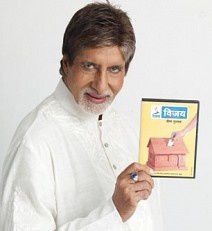


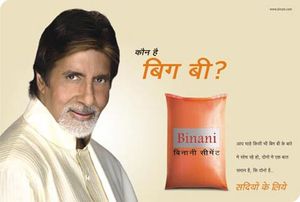
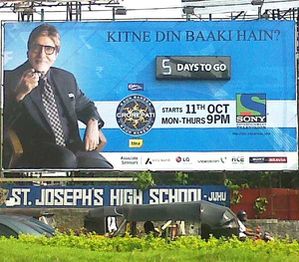


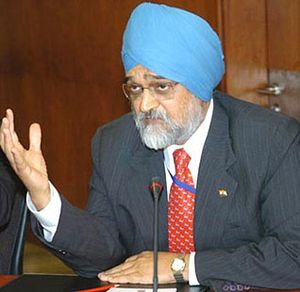 Montek Singh Ahluwalia, 67 ans,
Montek Singh Ahluwalia, 67 ans,  Les responsables de l'agence de SBI (State Bank of India) de Barabanki (Uttar
Pradesh) viennent de se faire sérieusement réprimandés.
Les responsables de l'agence de SBI (State Bank of India) de Barabanki (Uttar
Pradesh) viennent de se faire sérieusement réprimandés. I returned at 4pm. The man at the window looked surprised to see me. “Room 105!” he barked. In room 105, another man I had dealt with also seemed surprised to see me. He looked at the
clock, which said 4:05pm. Then he looked at me. “Receipt?” he asked. Unfortunately, I had not kept the receipt for the Dh30. This was apparently A Problem. “No receipt? No receipt?!?” He
gestured for me to wait, then left the room for 5 minutes.
I returned at 4pm. The man at the window looked surprised to see me. “Room 105!” he barked. In room 105, another man I had dealt with also seemed surprised to see me. He looked at the
clock, which said 4:05pm. Then he looked at me. “Receipt?” he asked. Unfortunately, I had not kept the receipt for the Dh30. This was apparently A Problem. “No receipt? No receipt?!?” He
gestured for me to wait, then left the room for 5 minutes. Nous sommes tombés par hasard sur ce texte écrit par un américain à
propos de la bureaucratie indienne et des problèmes de visa. Ce qui est assez remarquable, c'est que c'est tout simplement le récit détaillé de ce qui est réellement arrivé à quelqu'un qui a
voulu aller deux fois, à quelques jours d'intervalle, en Inde.
Nous sommes tombés par hasard sur ce texte écrit par un américain à
propos de la bureaucratie indienne et des problèmes de visa. Ce qui est assez remarquable, c'est que c'est tout simplement le récit détaillé de ce qui est réellement arrivé à quelqu'un qui a
voulu aller deux fois, à quelques jours d'intervalle, en Inde. re retarded.
re retarded.

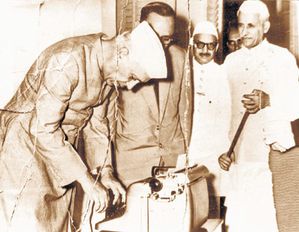 re Nehru encourage l’initiative et se laisse
volontiers photographié en train de taper à la machine !
re Nehru encourage l’initiative et se laisse
volontiers photographié en train de taper à la machine !.gif)

